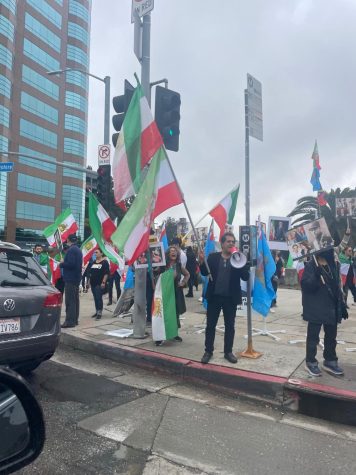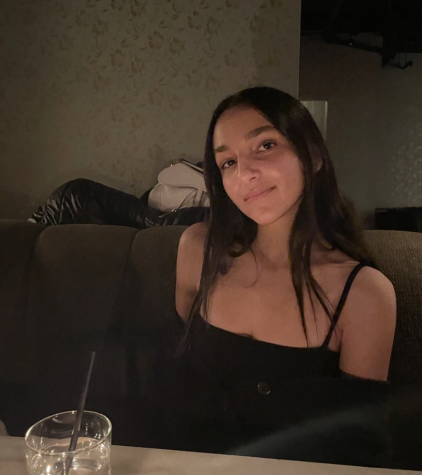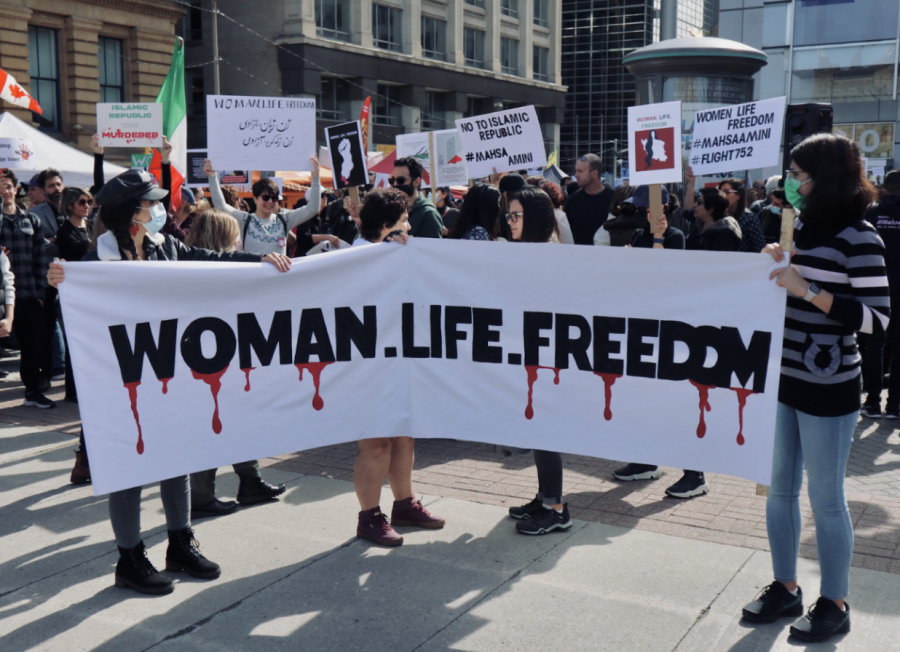‘Women, Life, Freedom’: Milken Students on the Iran Protests
Protestors holding the official slogan of the movement, ‘Woman, Life, Freedom’ (Taymaz Valley/CC BY 2.0)
On October 1, 2022, thousands of Iranian Americans swarmed the streets of Downtown Los Angeles chanting, “zan, zendegi, azadi,” from Pershing Square to Los Angeles City Hall. Women were cutting their ponytails off, and shaving their heads among large crowds. The slogan, “woman, life, freedom,” began 7,000 miles away in Iran, in the United States. Within the march, pre-revolutionary flags could be seen, and the anthem of the movement, Baraye was amplified.
Over three weeks later, October 25, 2022, Milken Community School sent an email with the subject line, ‘Message about Iran’ in which administrators addressed experiences of, “deep distress about the protests going on in Iran.” The email recognized that, “So many of our own community’s family members experienced brutality like this in the recent past.”
Soon after, a three-day protest in Iran erupted, honoring over 1,500 protesters killed by Iranian security forces in 2019, also known as Bloody November. Government and small business workers gathered in the streets of major Iranian cities chanting anti-government slogans including “Death to the dictator,” and “Cannons, tanks and guns won’t work anymore, tell my mother that she doesn’t have a daughter,”
But the current event’s impact on Milken’s community weighs in far beyond the news every morning. As the situation escalates, students and families have begun to speak out and act to condemn acts of violence and the lack of basic human rights in Iran. Many students, alumni, parents and faculty members can recall stories of loved ones who faced these injustices. Benjamin Hanasab ’23, whose parents immigrated from Iran in the 80’s said, “The current situation of women in Iran is very unfortunate… I feel connected to these women because my family once experienced this type of oppression… It is disheartening to see the Islamic Republic repeatedly oppress citizens even 50 years later”. His cousin, Oren Giladi ’23 acknowledges “It’s truly saddening how women are being mistreated and abused by their own government.”

In 2017 Milken highlighted alumna Shaina Pakravan ‘10 whose short film, ROKSANA premiered at LA Shorts Fest. The short film exhibited nuances in Los Angeles Iranian-American culture.
Led by Persian members of the Milken community, the school has made efforts to celebrate the Persian New Year, Nowruz, almost every single spring. The middle school usually holds a Persian-American Perspectives Panel to celebrate stories of immigration and journeys to achieving the American dream. Member of J-Life, Tiffany Tavakoli says, “Specific teachers at Milken have always acknowledged cultural differences that Iranians face among the rest of the student body. They embrace these differences and share them with the community to be celebrated.”
Seniors Nathaniel Farzadmehr ’23 and Nathan Namvar ’23 founded the Persian Culture Club in 2022 to “cultivate Persian and Middle Eastern culture,” according to Namvar. Through immersion into Persian cuisine, history and current events, they strive to make an impact on their community.
Last Passover, Milken asked three families to share their stories of immigration with the community. The project, A Modern Exodus highlighted my father, Iranian immigrant Daryoush Rad who described his experiences escaping Iran during the Islamic Revolution. He told Milken: “I had an exodus from Iran. I can identify with the Jews back in Egypt…maybe under different circumstances but 37 years ago I went through this experience myself….”
He shared his experiences being smuggled through the desert by the Taliban with nothing to eat or drink. He mentioned that he ended up in a refugee camp in Afghanistan, and later found himself living in Karachi Pakistan.
On September 13, 2022, 22-year-old Mahsa Amini was detained by the Iranian ‘morality’ police in Iran’s capital, Tehran. Amini was arrested for breaking Iran’s strict dress code. She was beaten to death and passed away after falling into a coma. In Iran, women are legally obliged to wear hijabs in public including non-Muslims and foreigners. On September 17, protests erupted during Amini’s funeral throughout cities in Iran including Tabriz, Ilam, Isfahan and Sari, chanting, “Women, Life, Freedom!” cutting their hair, and burning hijabs. Lily Kohanzad, who attended many protests across Los Angeles says she “fear[s] for the women in Iran, for their safety and freedom. I hope we can work together to help them achieve what they deserve.”
On September 19, authorities shut down the Internet and access to WhatsApp, Instagram, Skype and more throughout the country. The goal was to prevent images and videos of protests in Iran from reaching an international audience. Iran claimed blocking these sites was due to concerns of national security. Adam Kohankabir ’23 says, “Turning off all access to the outside world is the greatest form of oppression a country can impose upon its people. I feel deep pain towards families in Iran who cannot access their families across the sea for financial and emotional support.”
Later in September, Christiane Amanpour was scheduled to interview Iranian President Ebrahim Raisi in New York. This would be the first time Raisi would speak to American media on American soil. Raisi then declined the interview once Amanpour refused to wear a headscarf in his presence.
By September 30, over 66 people were killed in nationwide protests demanding regime changes and death to dictator Khameni. The next day, the governor of the northwest Kurdistan province confirmed the first three deaths from the protests. In retaliation, protestors killed five members of the Basij. Senior Michael Mossighi ’23 expressed his disappointment, “I am devastated yet proud because this is the largest female movement I have ever seen”.
On October 7, security forces murdered a 16-year-old girl, claiming she committed suicide. Another female student was reported dead, but the government claimed she was lost at a university campus in Tehran. Petrochemical workers at Iran’s Abadan Refinery and KanganPetro Refinery have walked out of work, uniting in an oil strike. On October 15, a fire broke out at Evin prison, where many foreign political prisoners are held. 4 Prisoners were found dead, and 61 injured.
This Yom Kippur, Jewish Iranians were told not to come to synagogue to ensure their safety and wellbeing. 8,500 Jews live in Iran today. Reflecting upon this tragedy, Jonathan Shalom told the Roar, “This Yom Kippur, I felt incredibly grateful to complete the mitzvah of praying in a temple safely with my community. To be prohibited from leaving my house on the holiest day of the year sounds terrifying.”
From November 9-27, thousands of Iranians in Isfahan held demonstrations against water shortages. In these violent protests, Iranian riot police arrested at least 67 protesters. As of November 29, 488 people, including 58 children, have been killed by security forces in Iran.
On November 15, the United Nations Human Rights twitter tweeted, “#Iran: We urge Iranian authorities to release thousands of peaceful protestors, revoke death sentences…”
Prior to their first game at the 2022 World Cup in Qatar, the national Iranian football team refused to sing the national anthem following a statement from team captain, Ehsan Hajsafi who stated his support for Mahsa Amini protestors. Following this incident, players were called to a meeting with members of the Iranian Revolutionary Guard Corps (IRGC). The families of Iran’s soccer team have been threatened if the players fail to “behave” ahead of their next match. Sources claim that there are many Iranian security guards in Qatar monitoring the players. Sofia Goldenstein ’23, a World Cup fan said, “I think that this action was very powerful, and took a lot of courage to do something as dangerous as this.”
Most recently, metalworkers, truck drivers, teachers and students in Mahshahr have gone on strike, students in Mahshahr have gone on strike, which led to the fall of the last Shah of Imperial Iran.
Ali Khameni’s sister, Badri Khamenei, has condemned the authoritarianism of her brother, hoping to see the overthrow of Iranian tyranny. She expressed, through her son’s Twitter account, that the regime of Ruhollah Khomeini has brought nothing but “suffering and oppression” to Iranians.
On December 7, Time Magazine announced the Women of Iran as the Heroes of 2022. They described Iranian women to be, “educated, secular, liberal” after taking the streets of Iran for the past four months. This is a huge step in the acknowledgement of Iranian efforts internationally. Writer on The Roar, Haley Kohanarieh ’23 said, “As a Persian-American woman, I feel immensely proud of my people, and look forward to the future of this movement.”
Daughter of Persian immigrants Noa Forouzanfar ’25 believes, “The people of Iran are very brave to be putting their lives at risk and creating change for the future. I think it is important [for] people [to] continue to spread their knowledge to gain freedom.” Camille Farahmand, a member of the Persian Culture Club shared, “I believe that this honor towards Iranian women will be a large source of motivation, as well as a call out to help for neighboring nations.”
Nearly 39% of Milken’s student body are Iranian-American. Many of these students are first generation Americans, whose parents are immigrants, and were forced to escape terror in pursuit of human rights and refuge in the United States.
The immigration of Persian Jews before, during and after the Iranian Revolution was attributed to the fear of religious persecution, economic injustice, and domestic violence from the government. The Islamic Republic’s anti-Zionist policies created uncomfortable situations for Iranian Jews, who were vulnerable to alleged collaboration with Israel.
Some persians feel connected towards their homeland, as it was once a safe haven and home. Brooke Abselet ’23, whose parents instill Iranian culture in their household, shared, “Hearing stories of pre-revolution Iran gives me excitement about what the future holds. I try to embrace my culture through tradition, food, and language to pass on to my future generations.” Aiden Javaheri ’23, who embraces his culture through music said, “I hope that one day, I can visit Iran with my friends and family. I hope to visit the cities my grandparents and parents grew up in and see the beauty they could experience.” Others feel a deep sense of discomfort towards the oppressive regime. Benjamin Hanasab ’23 says “I feel disconnected from Iran while watching the government restrict everyday life from innocent citizens. I feel ashamed that my culture and heritage is being misrepresented by Ayatollahs.”
Throughout recent months, Milken students have adopted cultural traditions of Persians. For example, Jewish Studies Instructor and Tarbut Programming Director, Ms. Jessie Mallor, often sets up a table with selections of Ceylon and Earl Grey tea, along with Middle Eastern treats such as Nokhodchi, Shirini, and Kormah. This practice reminds students of Iranian tea culture, a large phenomenon dating back to dynastic Iran following Iranians to America today. Her student, Aiden Pourbaba ’23 expressed, “Ms. Mallor’s efforts to create such abundant tables of sweets for her students shows her dedication to embracing cultures around her while bringing the community together over foods. Persians have a historical connection to what we know to be ‘chai’ or tea with sugar.”
To offer, “conversation spaces in the hopes of better understanding what’s happening,” Milken’s new Director of College Counseling & Academic Planning, Elliot Shavalion offered a lunch session to join a conversation about events in Iran. He mentioned, “…the space is open to each of us as we continue to navigate this difficult situation together and support one another.” School president, Ethan Pakravan ’23 said, “I found comfort in Mr. Shavalian’s efforts to support worried students and faculty. It was a rewarding way to understand how the trauma our ancestors faced are manifested into today’s political arena in Iran.”
On November 4, 2022, AP Comparative Government teacher, Mr. Gibert, explained to his class that in agreement with the Head of School, Dr. Sarah Shulkind, he will open up his Iran unit to any members of the Milken community. He explained that there is a, “need to break this taboo about what really happened in ‘79.” He hopes to create more empathy and understanding to eventually take positive action towards what’s going on in Iran. He addressed that when Ukraine was in danger that Milken rose, but in regards to Iran, there is an “uncomfortable silence”. Mr. Gibert expressed, “Respect is long due… the Persian voice must have as much as the Ashkenazi… [Persian voices have] been undervalued for too long.” Mr. Gilbert’s student, Julia Nooriani ’23 expressed her appreciation, “I felt honored by my teacher, Mr. Gibert, for calling out upon our community to draw attention to our lack of response and respect. It made me feel empowered to have a teacher who deeply cares to straighten out the acknowledgement that this situation deserves.”
Political activists have been calling attention to the ways in which we can help Iranian women and girls from a distance. For example, funding organizations such as the Women’s Committee of the National Council of Resistance of Iran will work to fight against gender-based inequities in Iran. Posting on social media serves as a voice against the Islamic Republic of Iran to be removed from the UN Commission on the Status for Women.

Jasmine Rad is a senior at Milken and a first year writer for The Roar. She enjoys writing articles about culture, current events and the Milken community....



